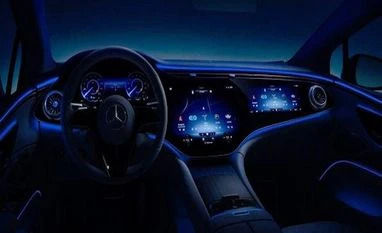With plans afoot to locally assemble its all-electric sedan EQS in India, luxury carmaker Mercedes-Benz is looking to accelerate sales of electric vehicles in the country, according to a senior company official.
Mercedes-Benz India plans to bring to the market the locally assembled EQS electric sedan in the fourth quarter of 2022 to add to the all-electric SUV EQC, which was launched as a fully imported unit in October 2020 priced at Rs 1.07 crore.
"We have taken a step by step approach in developing electric vehicle strategy in India. EQC was first available in six markets in India and gradually expanded. Now we are in 50 cities with the EQC and the next step is to expand the portfolio with a car, which we believe has a stronger volume appeal and producing it locally," Mercedes-Benz India Managing Director & CEO Martin Schwenk told PTI.
Elaborating further on the electrification plans, he said, "When we did the rollout of the brand EQC we actually looked into what safe numbers we can expect. We do the same in the EQS. At the end, you have to think of which car has a volume aspiration that makes sense for local production."
The EQS will be launched in the fourth quarter of 2022 and it will be assembled at the company's plant at Chakan in Maharashtra.
"It is a car with completely different characteristics. It's a luxury sedan and it has a different customer base and we would also expect a broader base of interest. So the local production makes sense," Schwenk said.
When asked if the local assembly of the EQS would lead to other future EV models to be assembled in India, he said,"We are planning on the one hand and on the other we are acting based on how the environment is developing. We now see the time is mature to bring locally produced EQS."
Schwenk further said,"What we will do on top in future, these are plans that are to be made based on the market conditions, expectations of the customers that are developing...So we will also look into what are the signs in the market..."
Mercedes-Benz has a "strong backbone of products" in its global EV portfolio and the company is in a position to assess which car has the best chance to be launched in India either as locally produced or as an imported vehicle.
"This conversation will continuously happen but it will only be decided when we feel we see a clearer view of what the next step should be," Schwenk said.
More From This Section
When asked with plans to start local assembly of the EQS, has Mercedes-Benz India given up on demands for reduction in customs duties of imported vehicles, specially EVs, he said the company will not change anything in its stand as "very high import duties limit the localisation of the technology and adoption in the market".
"So, whatever would happen to ease the pain on duties would eventually lead us to have other options in terms of growing the market, and higher demand would be created and we'll also see other options for localisation," Schwenk said.
)